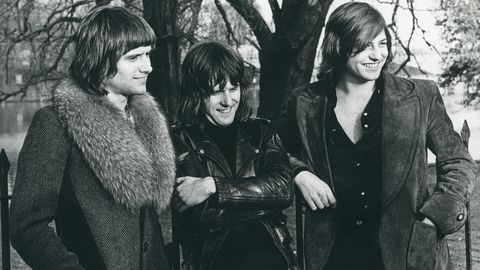Forty years ago, punk decried Emerson Lake & Palmer perhaps more than any other band. But today their so‐called defects look like merits, even more so in the tragic light of Keith Emerson’s suicide earlier this year. In this digital age, such dazzling prowess is increasingly a sad relic of a bygone era. And actually, how punk is Emerson’s disregard for convention, his sacrilegious marriage of classical and rock, and his dextrous pyrotechnics?
A good time, then, to reevaluate these instrumental titans – or rather iconoclasts, given their unorthodox antipathy towards rock brevity and simplicity. Part of a chronological reissue programme that will continue throughout 2016‐’17, here are ELP’s first three albums, and a new collection. The original albums include bonus discs and will also be available in vinyl (single‐LP only) and digital download formats.
The 1970 debut, follow‐up Tarkus (1971) and live take on Russian composer Modest Mussorgsky’s opus, Pictures At An Exhibition (also ’71), all now feature a second disc of stereo mixes by Steven Wilson (and in the latter’s case, another concert performance of the suite), plus a handful of extra tracks, usually alternate takes. The three‐CD Anthology comprises 39 tracks from throughout their career and comes with liner notes and 2016 interviews with Messrs Emerson and Lake.
The debut’s menacing The Barbarian and Knife-Edge both capture the post‐Altamont mood and are more aggressive than the noodling ambience you might expect. Emerson daubs crazed splashes of keyboard across the sonic canvas – even in this esteemed virtuosic company, he dominates proceedings. The Three Fates is fantastically forbidding, and Tank is a face‐off that set the bar for 70s extrapolation, cosmic synthed‐up sci‐fi rock to match Yes’s contemporaneous output.
A diatribe against war and religion, Tarkus ranges from the novelty flotsam of Jeremy Bender to the esoteric Infinite Space (Conclusion) that posits ELP as a modern jazz trio. Meanwhile, the title track is a spellbinding accomplishment comprising more tempo changes and shifts of tone and style than most music careers.
As for Pictures, it’s the very definition of experimental and progressive, next to which The Damned et al start to look very safe indeed.
What Was Your Favourite Piece Of Music From Keith Emerson?



